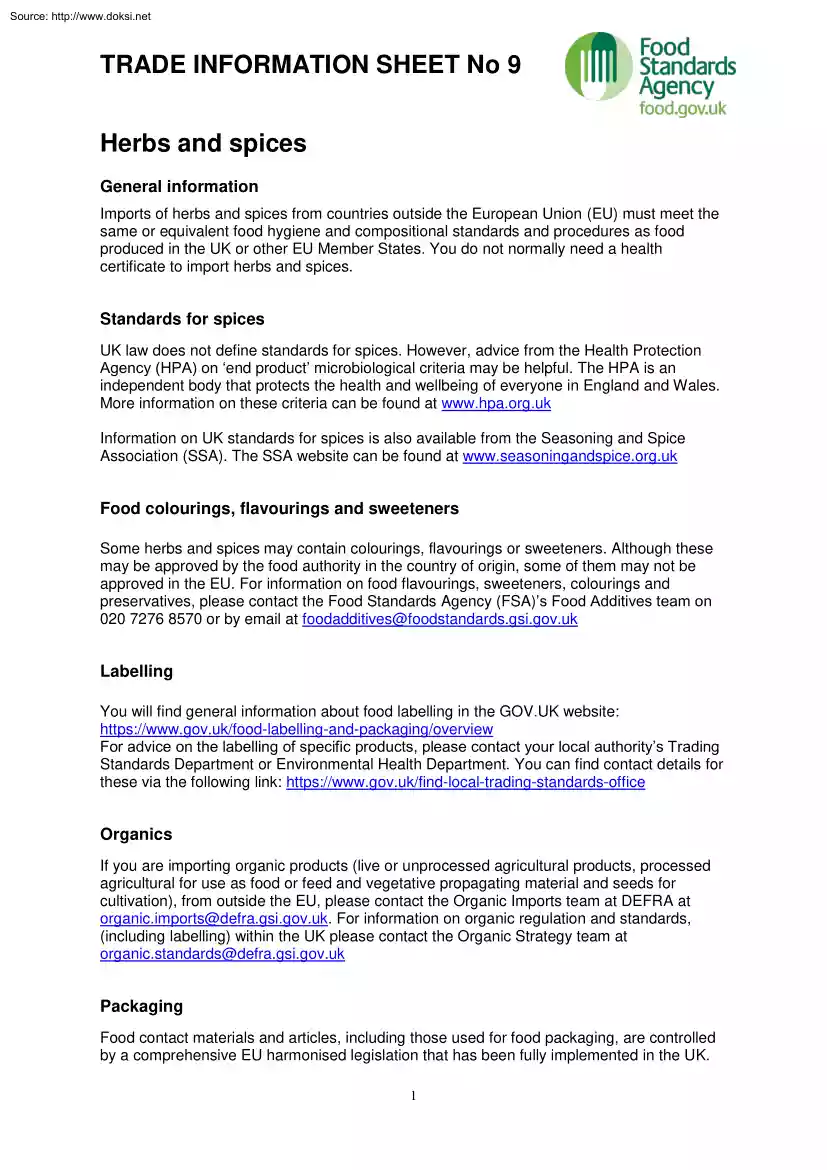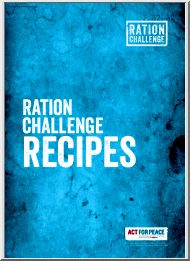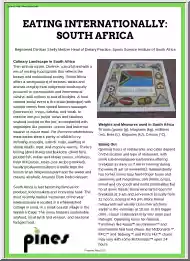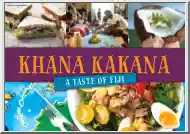A doksi online olvasásához kérlek jelentkezz be!

A doksi online olvasásához kérlek jelentkezz be!
Nincs még értékelés. Legyél Te az első!
Mit olvastak a többiek, ha ezzel végeztek?
Tartalmi kivonat
Source: http://www.doksinet TRADE INFORMATION SHEET No 9 Herbs and spices General information Imports of herbs and spices from countries outside the European Union (EU) must meet the same or equivalent food hygiene and compositional standards and procedures as food produced in the UK or other EU Member States. You do not normally need a health certificate to import herbs and spices. Standards for spices UK law does not define standards for spices. However, advice from the Health Protection Agency (HPA) on ‘end product’ microbiological criteria may be helpful. The HPA is an independent body that protects the health and wellbeing of everyone in England and Wales. More information on these criteria can be found at www.hpaorguk Information on UK standards for spices is also available from the Seasoning and Spice Association (SSA). The SSA website can be found at wwwseasoningandspiceorguk Food colourings, flavourings and sweeteners Some herbs and spices may contain colourings,
flavourings or sweeteners. Although these may be approved by the food authority in the country of origin, some of them may not be approved in the EU. For information on food flavourings, sweeteners, colourings and preservatives, please contact the Food Standards Agency (FSA)’s Food Additives team on 020 7276 8570 or by email at foodadditives@foodstandards.gsigovuk Labelling You will find general information about food labelling in the GOV.UK website: https://www.govuk/food-labelling-and-packaging/overview For advice on the labelling of specific products, please contact your local authority’s Trading Standards Department or Environmental Health Department. You can find contact details for these via the following link: https://www.govuk/find-local-trading-standards-office Organics If you are importing organic products (live or unprocessed agricultural products, processed agricultural for use as food or feed and vegetative propagating material and seeds for cultivation), from
outside the EU, please contact the Organic Imports team at DEFRA at organic.imports@defragsigovuk For information on organic regulation and standards, (including labelling) within the UK please contact the Organic Strategy team at organic.standards@defragsigovuk Packaging Food contact materials and articles, including those used for food packaging, are controlled by a comprehensive EU harmonised legislation that has been fully implemented in the UK. 1 Source: http://www.doksinet This legislation is particularly thorough in its control of plastic materials and articles intended for food use. For information on the safety of packaging please contact the Food Contact Materials Team on 020 7276 8570 or by email at: FoodContactMaterial@foodstandards.gsigovuk Food hygiene For general enquiries on food hygiene please contact the Food Hygiene Policy Team by email at foodhygiene.policy@foodstandardsgsigovuk Pesticides For information on pesticides safety levels for imports please contact
Health and Safety Executive’s (HSE) Chemicals Regulation Directorate (CRD) by accessing the link: http://www.pesticidesgovuk/ Contaminants A guidance note on the Contaminants in Food (England) Regulations 2013, which make provision for enactment and enforcement of Commission Regulations setting regulatory limits for contaminants in food (nitrate, mycotoxins, metals, 3-MCPD dioxins and PAHs), can be found at http://www.foodgovuk/news-updates/news/2013/oct/regulations Import restrictions There are some other import restrictions/requirements that can apply to herbs and spices of which importers need to be aware. “Higher-risk” products As of 25 January 2010 imports of certain feed and food of non-animal origin that are considered to be “higher-risk” can only enter the UK through specific ports and airports which are designated points of entry (DPEs) where official controls will be carried out. A “higher-risk” product is feed or food that is either known to be, or is, an
emerging risk to public health. Further information for business operators can be found at http://www.foodgovuk/foodindustry/imports/banned restricted/highrisknonpoao For a complete list of foods (not of animal origin) with current EU restrictions, please see the following link on the FSA’s website: www.foodgovuk/foodindustry/imports/banned restricted/restricted foodstuffs Kava-kava Since 9 January 2003 the herb Kava-kava, and any food containing it, is banned from entry to the UK. This is because of concerns regarding its toxic effect on the liver For further information please contact DH customer service centre at http://www.dhgovuk/health/contact-dh or on 020 7210 4850 at the Department of Health 2 Source: http://www.doksinet Imports of feed and food from Japan As of 27 March 2011 imports of all feed and food originating in or consigned from Japan to the EU are subject to special conditions. This is following the accident at the Fukushima Daiichi nuclear power plant in Japan
in March 2011. This will mean that consignments of feed and food can only enter the UK through specific ports and airports where official controls will be carried out. Further information for business operators can be found at: http://www.foodgovuk/foodindustry/imports/banned restricted/japan Imported Food Team, Food Standards Agency, Aviation House, 125 Kingsway, London, WC2B 6NH Email: imported.food@foodstandardsgsigovuk March 2016 3
flavourings or sweeteners. Although these may be approved by the food authority in the country of origin, some of them may not be approved in the EU. For information on food flavourings, sweeteners, colourings and preservatives, please contact the Food Standards Agency (FSA)’s Food Additives team on 020 7276 8570 or by email at foodadditives@foodstandards.gsigovuk Labelling You will find general information about food labelling in the GOV.UK website: https://www.govuk/food-labelling-and-packaging/overview For advice on the labelling of specific products, please contact your local authority’s Trading Standards Department or Environmental Health Department. You can find contact details for these via the following link: https://www.govuk/find-local-trading-standards-office Organics If you are importing organic products (live or unprocessed agricultural products, processed agricultural for use as food or feed and vegetative propagating material and seeds for cultivation), from
outside the EU, please contact the Organic Imports team at DEFRA at organic.imports@defragsigovuk For information on organic regulation and standards, (including labelling) within the UK please contact the Organic Strategy team at organic.standards@defragsigovuk Packaging Food contact materials and articles, including those used for food packaging, are controlled by a comprehensive EU harmonised legislation that has been fully implemented in the UK. 1 Source: http://www.doksinet This legislation is particularly thorough in its control of plastic materials and articles intended for food use. For information on the safety of packaging please contact the Food Contact Materials Team on 020 7276 8570 or by email at: FoodContactMaterial@foodstandards.gsigovuk Food hygiene For general enquiries on food hygiene please contact the Food Hygiene Policy Team by email at foodhygiene.policy@foodstandardsgsigovuk Pesticides For information on pesticides safety levels for imports please contact
Health and Safety Executive’s (HSE) Chemicals Regulation Directorate (CRD) by accessing the link: http://www.pesticidesgovuk/ Contaminants A guidance note on the Contaminants in Food (England) Regulations 2013, which make provision for enactment and enforcement of Commission Regulations setting regulatory limits for contaminants in food (nitrate, mycotoxins, metals, 3-MCPD dioxins and PAHs), can be found at http://www.foodgovuk/news-updates/news/2013/oct/regulations Import restrictions There are some other import restrictions/requirements that can apply to herbs and spices of which importers need to be aware. “Higher-risk” products As of 25 January 2010 imports of certain feed and food of non-animal origin that are considered to be “higher-risk” can only enter the UK through specific ports and airports which are designated points of entry (DPEs) where official controls will be carried out. A “higher-risk” product is feed or food that is either known to be, or is, an
emerging risk to public health. Further information for business operators can be found at http://www.foodgovuk/foodindustry/imports/banned restricted/highrisknonpoao For a complete list of foods (not of animal origin) with current EU restrictions, please see the following link on the FSA’s website: www.foodgovuk/foodindustry/imports/banned restricted/restricted foodstuffs Kava-kava Since 9 January 2003 the herb Kava-kava, and any food containing it, is banned from entry to the UK. This is because of concerns regarding its toxic effect on the liver For further information please contact DH customer service centre at http://www.dhgovuk/health/contact-dh or on 020 7210 4850 at the Department of Health 2 Source: http://www.doksinet Imports of feed and food from Japan As of 27 March 2011 imports of all feed and food originating in or consigned from Japan to the EU are subject to special conditions. This is following the accident at the Fukushima Daiichi nuclear power plant in Japan
in March 2011. This will mean that consignments of feed and food can only enter the UK through specific ports and airports where official controls will be carried out. Further information for business operators can be found at: http://www.foodgovuk/foodindustry/imports/banned restricted/japan Imported Food Team, Food Standards Agency, Aviation House, 125 Kingsway, London, WC2B 6NH Email: imported.food@foodstandardsgsigovuk March 2016 3




